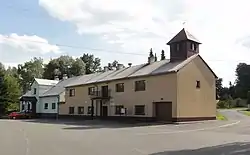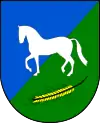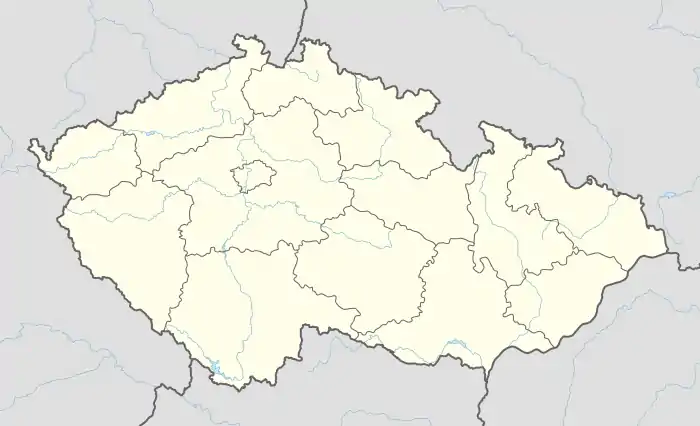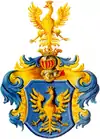Vělopolí
![]() Vělopolí (Polish:
Vělopolí (Polish: ![]() Wielopole) is a village in Frýdek-Místek District, Moravian-Silesian Region, Czech Republic. It has a population of 206 (2001 census), 19% of the population are the Poles and more than 50% of population are Protestants.[2] The village lies in the historical region of Cieszyn Silesia.
Wielopole) is a village in Frýdek-Místek District, Moravian-Silesian Region, Czech Republic. It has a population of 206 (2001 census), 19% of the population are the Poles and more than 50% of population are Protestants.[2] The village lies in the historical region of Cieszyn Silesia.
Vělopolí
Wielopole | |
|---|---|
Village | |
 Municipal office | |
 Flag  Coat of arms | |
 Location in the Czech Republic | |
| Coordinates: 49°42′14″N 18°34′11″E | |
| Country | Czech Republic |
| Region | Moravian-Silesian |
| District | Frýdek-Místek |
| First mentioned | 1448 |
| Government | |
| • Mayor | Vladislava Latochová |
| Area | |
| • Total | 2.98 km2 (1.15 sq mi) |
| Elevation | 370 m (1,210 ft) |
| Population (2019)[1] | |
| • Total | 285 |
| • Density | 96/km2 (250/sq mi) |
| Postal code | 739 59 |
| Website | Official website |
The name is of topographic origins denoting a large [arable] land (wiele (wielkie) pole).[3]
History
The village was first mentioned in 1448 as z [from] Wele Pole.[3][4] Politically it belonged then to the Duchy of Teschen, a fee of the Kingdom of Bohemia, which after 1526 became part of the Habsburg Monarchy.
.jpg.webp)
After Revolutions of 1848 in the Austrian Empire a modern municipal division was introduced in the re-established Austrian Silesia. The village as a municipality was subscribed to the political and legal district of Cieszyn. According to the censuses conducted in 1880, 1890, 1900 and 1910 the population of the municipality dropped from 327 in 1880 to 306 in 1910 with all the inhabitants being native Polish-speakers. In terms of religion in 1910 the majority were Protestants (88.2%), followed by Roman Catholics (11.8%).[5] The village was also traditionally inhabited by Cieszyn Vlachs, speaking Cieszyn Silesian dialect.
After World War I, fall of Austria-Hungary, Polish–Czechoslovak War and the division of Cieszyn Silesia in 1920, it became a part of Czechoslovakia. Following the Munich Agreement, in October 1938 together with the Zaolzie region it was annexed by Poland, administratively adjoined to Cieszyn County of Silesian Voivodeship.[6] It was then annexed by Nazi Germany at the beginning of World War II. After the war it was restored to Czechoslovakia.
References
- "Population of municipalities of the Czech Republic". Czech Statistical Office. 1 January 2019.
- "2001 census data". Czech Statistical Office.
- Mrózek, Robert (1984). Nazwy miejscowe dawnego Śląska Cieszyńskiego [Local names of former Cieszyn Silesia] (in Polish). Katowice: Uniwersytet Śląski w Katowicach. p. 182. ISSN 0208-6336.
- Panic, Idzi (2010). Śląsk Cieszyński w średniowieczu (do 1528) [Cieszyn Silesia in the Middle Ages (until 1528)] (in Polish). Cieszyn: Starostwo Powiatowe w Cieszynie. p. 313. ISBN 978-83-926929-3-5.
- Piątkowski, Kazimierz (1918). Stosunki narodowościowe w Księstwie Cieszyńskiem (in Polish). Cieszyn: Macierz Szkolna Księstwa Cieszyńskiego. pp. 266, 284.
- "Ustawa z dnia 27 października 1938 r. o podziale administracyjnym i tymczasowej organizacji administracji na obszarze Ziem Odzyskanych Śląska Cieszyńskiego". Dziennik Ustaw Śląskich (in Polish). Katowice. nr 18/1938, poz. 35. 31 October 1938. Retrieved 1 July 2014.

